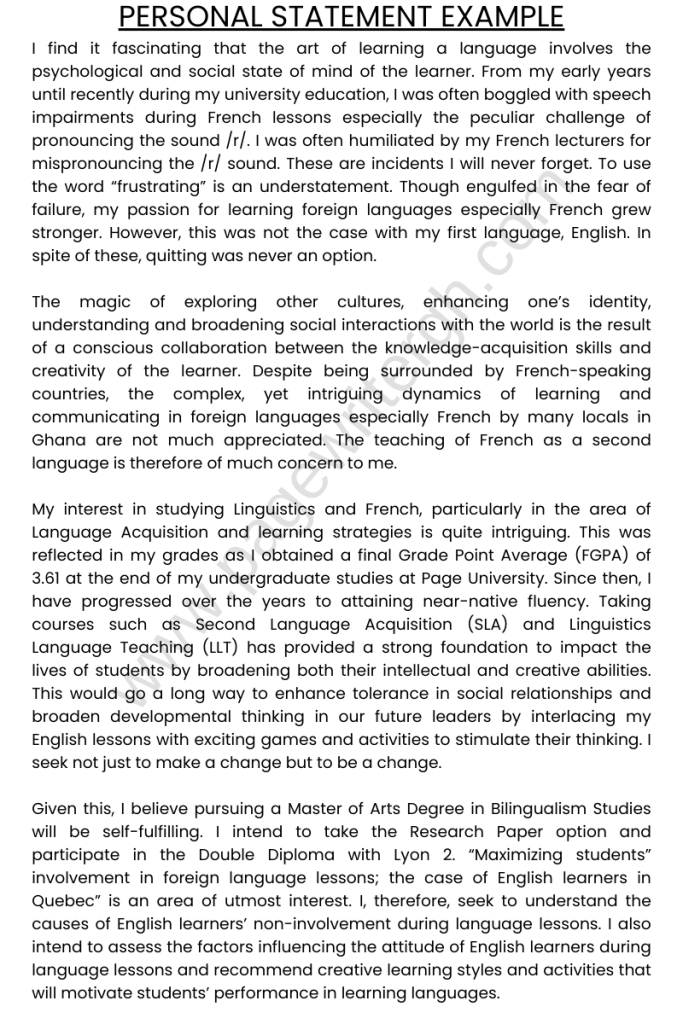Table of Contents
Whether you’re a recent graduate seeking to further your education or a professional aiming to specialise in your field, a well-crafted personal statement for graduate school can significantly impact your chances of getting into your desired graduate school.
A compelling personal statement for graduate school is your opportunity to showcase your unique qualities, experiences, and aspirations.
Need expert help or advice, Page Writer Ghana is your trusted academic writing assistant.
In this comprehensive guide, we’ll walk you through the process of writing a winning personal statement for graduate school, providing expert insights, practical tips, and frequently asked questions to help you succeed.
Read Also: How To Check Plagiarism Using Turnitin Software
11 Tips for Crafting a Compelling Personal Statement for Graduate School

Crafting a winning personal statement for your graduate school requires careful planning and meticulous execution. Follow these steps to create a compelling and memorable personal statement that captures the attention of admissions committees:
1. Understanding the Purpose of a Personal Statement
Your personal statement is your opportunity to introduce yourself to the admissions committee and convey why you are an ideal candidate for their programme. It should provide insights into your academic background, experiences, motivations, and aspirations. The personal statement allows the committee to gauge your compatibility with the programme and assess your potential contributions to the academic community.
2. Researching Your Chosen Programme and Institution
Thoroughly research the programme and institution you’re applying to. Understand their values, strengths, and areas of expertise. Tailor your personal statement to reflect how your goals align with the programme. Mention specific faculty members, courses, or research opportunities that interest you. This demonstrates your genuine interest and commitment to the programme.
3. Structuring Your Personal Statement
A well-organized personal statement follows a logical structure. Divide your statement into three main parts: introduction, body, and conclusion. In the introduction, engage the reader with a captivating opening. The body should focus on your academic background, experiences, and motivations. Conclude by summarising your key points and expressing enthusiasm for the programme.
Read Also: How To Write A Project Proposal: A Comprehensive Guide
4. Captivating with a Strong Opening
The opening of your personal statement should grab the reader’s attention and set the tone for the rest of the essay. Consider starting with a thought-provoking question, or a compelling anecdote, that relates to your field of study. An engaging opening encourages the reader to continue and invests them in your story.
5. Showcasing Your Academic Background
Highlight your academic achievements and relevant coursework. Discuss projects, research, or papers that showcase your passion and dedication to your field. Avoid simply listing accomplishments; instead, reflect on how these experiences shaped your academic journey and influenced your decision to pursue a postgraduate degree.
6. Highlighting Relevant Experiences
In addition to academic achievements, emphasize extracurricular activities, internships, jobs, or volunteer work that relates to your chosen field. Describe how these experiences have enriched your skills, broadened your perspective, and reinforced your commitment to your future career.
7. Conveying Your Passion and Motivation
Articulate your genuine passion for your chosen field of study. Share the experiences that ignited your interest and explain how these experiences have fueled your motivation to excel in your postgraduate degree programme. Passionate individuals often stand out to admissions committees, as they are more likely to contribute positively to the academic community.
7. Demonstrating Future Goals and Aspirations
Discuss your long-term goals and how the programme aligns with them. Admissions committees want to see that you have a clear vision for your future and that the programme will be instrumental in helping you achieve those goals. Connect your aspirations to the resources and opportunities offered by the programme.
Read Also: 8 Common Student Problems You Must Avoid
8. Tailoring Your Statement to Each Institution
While it’s time-consuming, tailoring your personal statement to each institution is essential. Customise your statement to highlight why you’re a perfect fit for that specific programme. Mention faculty members, research centres, or initiatives that align with your interests. This demonstrates your dedication and enhances your chances of acceptance.
9. Writing Style and Tone
Maintain a formal and professional tone throughout your personal statement. Be concise and avoid using overly complex language. Focus on clarity and coherence in your writing. Use transitions to connect ideas and ensure a smooth flow. Your writing style should reflect your ability to communicate effectively in an academic setting.
10. Polishing Your Personal Statement
After drafting your personal statement, take time to revise and proofread it thoroughly. Check for grammar, spelling, and punctuation errors. Eliminate any repetitive or irrelevant information. Consider seeking feedback from professors, mentors, or peers who can provide valuable insights and suggestions for improvement.
Read Also: 5 Ways To Conquer Your Fear of Public Speaking
Dos and Don’ts: Personal Statement for Graduate School
Be mindful of these while planning and drafting your personal statement.
| DO’S | DON’TS |
| Be authentic and genuine in your writing. | Avoid plagiarising or using clichés. |
| Provide concrete examples to support your claims. | Avoid focusing solely on your weaknesses; emphasize your strengths. |
| Use specific language and avoid vague statements. | Don’t rush the writing process; give yourself ample time. Don’t begin with a quote. |
Personal Statement Example

Frequently Asked Questions (FAQs)
Q: What’s the ideal length for a personal statement?
A: Most institutions provide a word limit. Aim for a statement that’s concise yet comprehensive, usually around 500 to 800 words.
Q: Can I use humour in my personal statement?
A: While a touch of humour can humanise your statement, ensure it aligns with the programme’s culture and maintains a professional tone.
Q: Should I mention any challenges or setbacks I’ve faced?
A: It’s appropriate to mention challenges if they shaped your journey or highlight your resilience. Focus on how you’ve grown and overcome.
Q: Can I reuse content from a previous personal statement?
A: While you can draw inspiration from past statements, avoid copying entire sections. Tailor your statement to each programme’s requirements.
Q: How can I stand out from other applicants?
A: Highlight your unique experiences, perspectives, and aspirations. Convey your passion and demonstrate your potential contributions to the programme.
Q: Is it necessary to address weaknesses in my application?
A: If there’s a legitimate reason for weakness, briefly address it and emphasise the steps you’ve taken to overcome it.
Connect and Join or community of experts, discuss academia or any self-development topic. Contact Page Writer Ghana today, for original, compelling personal statements and watch the magic.
Crafting a winning personal statement for graduate school is a vital step in securing your spot in the programme of your dreams. By following these expert tips and insights, you can create a compelling and impactful personal statement that showcases your unique qualities and demonstrates your commitment to academic excellence. Remember, authenticity, passion, and a clear connection to the programme’s offerings are key to writing a statement that captures the attention of admissions committees.






Pingback:Why Failure Is Good For You - PAGE WRITER GH